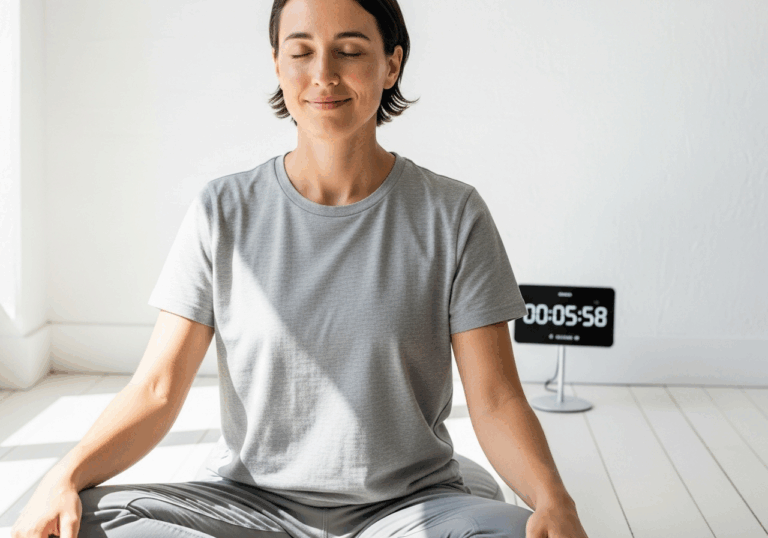Science-Backed Tips
Boost Your Resilience with 1-Minute Breathing
1-minute deep breathing correlates with 24-hour HRV measures.
📊 Did you know?
💡 Why It Matters
1️⃣
Improving HRV through brief breathing exercises can enhance emotional resilience, potentially reducing anxiety and stress.
2️⃣
Higher HRV is associated with better autonomic balance, which is linked to improved mood stability.
3️⃣
Incorporating short breathing sessions into daily routines may lead to long-term mental health benefits.
✅ Try These Micro-Tips
🎯
Practice 1-minute deep breathing exercises three times a day.
🎯
Inhale deeply for 4 seconds, hold for 4 seconds, and exhale for 4 seconds.
🎯
Use guided breathing apps for structured sessions.
🎯
Incorporate breathing exercises before stressful situations to enhance emotional regulation.
📚 The study
The study aimed to determine whether a brief, paced deep breathing exercise could reflect long-term heart rate variability (HRV) measures.
By comparing HRV variables during a one-minute breathing session to 24-hour monitoring, researchers found strong correlations: high-frequency (HF) power at r=0.60, root mean square of successive differences (RMSSD) at r=0.62, and standard deviation of NN intervals (SDNN) ranging from r=0.41 to 0.59, all statistically significant (p<0.01).
These findings suggest that even short micro-breathing exercises can support autonomic balance, which is closely linked to mood stability.
This is particularly important as higher HRV is associated with better emotional resilience, potentially reducing anxiety and stress levels.
By incorporating brief breathing sessions into our daily routines, we can cultivate long-term mental health benefits, enhancing our overall emotional well-being.
So, why not take a minute today to breathe deeply and reconnect with your inner calm?
❓ Frequently Asked Questions ❓
Learn more
What is the purpose of a 1-minute deep breathing assessment?
The purpose is to evaluate how brief deep breathing sessions can reflect long-term heart rate variability (HRV) measures. This assessment shows that even short sessions can indicate higher HRV and emotional resilience.
How does deep breathing affect heart rate variability (HRV)?
Deep breathing exercises can enhance HRV, which is associated with better autonomic balance and improved mood stability. Higher HRV indicates greater emotional resilience and reduced anxiety and stress.
What are the recommended steps for a 1-minute deep breathing exercise?
Inhale deeply for 4 seconds, hold your breath for 4 seconds, and then exhale for 4 seconds. Repeat this cycle for one minute to promote relaxation and improve HRV.
How often should I practice deep breathing exercises?
It is recommended to practice 1-minute deep breathing exercises three times a day. Regular practice can lead to long-term mental health benefits and improved emotional regulation.
What tools can help with deep breathing exercises?
Guided breathing apps can provide structured sessions to help you practice deep breathing effectively. These tools often include timers and visual cues to enhance your experience.
Can deep breathing exercises be beneficial before stressful situations?
Yes, incorporating deep breathing exercises before stressful situations can enhance emotional regulation. This practice helps to calm the mind and prepare the body to handle stress more effectively.
What is the significance of the correlation between deep breathing and HRV?
The correlation between deep breathing and HRV indicates that even brief sessions can support autonomic balance linked to mood stability. This suggests that short breathing exercises can have a meaningful impact on emotional well-being.
What does RMSSD stand for and why is it important?
RMSSD stands for Root Mean Square of Successive Differences, a measure of heart rate variability. It is important because it reflects the autonomic nervous system’s ability to adapt to stress and is associated with emotional resilience.
How does high-frequency power relate to emotional resilience?
High-frequency power is a component of HRV that indicates parasympathetic nervous system activity, which is linked to emotional resilience. Higher levels of high-frequency power suggest better stress management and mood stability.
What are the long-term benefits of practicing deep breathing exercises?
Long-term practice of deep breathing exercises can lead to improved mental health, reduced anxiety, and enhanced emotional resilience. Regular engagement in these exercises supports overall well-being and stress management.





